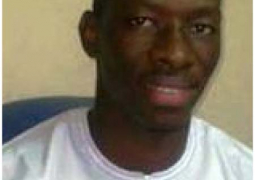
I would like to thank the United Nations Office on Drugs and Crime for their leadership in this initiative as well as Interpol and the World Customs Organization for their valuable contribution as project partners.
Also, many thanks to the trainers from the Italian Guardia di Finanza for their contribution and efforts during the mentoring sessions organised over the past two weeks.
AIRCOP is an example of the close, successful cooperation between the European Union, EU Member States agencies, international organizations, and beneficiary countries from Africa, Latin America and the Caribbean in fighting our common challenges.
Because of the trans-regional scope of this project and the multiple activities conducted in its framework, being part of it as well as of thelarge network of Joint Airport Interdiction Task Forces will be beneficial for The Gambia.
Through training and mentoring, local capacities will be strengthened, new working procedures will be learned and current procedures will be improved,
Best practices and experiences will be shared with peer practitioners from European, African and Latin American countries,
Access to international expertise as well as connections with international organizations like Interpol and the World Customs Organizationwill be made easier.
Through these new opportunities, The Gambia will be able to step up its efforts to fight organized crime and drug trafficking, which we all know is a very high priority of The Gambian Government.
Drugs trafficking is one of the major sources of revenue of organized crime that some estimate to amount to 300 billion US$ per year.
Cocaine is transported from South America to the European Union across the Atlantic by air and maritime routes. Although maritime shipments pose the greatest problem because large quantities can be transported and detection is challenging,individual couriers and air freight also play an important role.
In West Africa the problem is reaching acute levels. Given the wholesale value of a single ton of cocaine in Europe, the potential for criminal groups to sow corruption and support violent groups is considerable.
The West African route, mainly passing through countries along the Gulf of Guinea and the Sahel & Sahara areas, has been used for some time as transhipment, repackaging and storage region for cocaine from South America.It is estimated that between 8 to 13% of cocaine trafficking to Europe flows through West Africa - approximately 18 tons per year. Even at a reduced level since 2008, it is still estimated that the flow is worth 1.25 billionUS$.
Transnational organized crime is one of the major threats to human security, affecting the social, economic, political and cultural developments of our societies. We know that in order to fight it, we have to fight back together at a national, regional and global level.
The European Union is fully committed to support the fight against organized crime and drug trafficking.In Europe, fighting against organized crime has been a major policy objective since the 1992 Maastricht Treaty. A number of instruments and tools have been adopted by the European Union in order to harmonize national legislation, create specialised agencies such as Europol and Eurojust and to promote police and judicial cooperation.
One of the main instruments of the European Union to support the fight against organized crime and drug trafficking in partner countries is the Instrument for Stabilitynow known as the “Instrument contributing to Stability and Peace (IcSP)”, which was established in 2007.
From 2007-2013, the Instrument has allocated about 139 million euros to fund measures to fight global and trans-regional threats, of which 57% are for projects focused on organised crime.
Comprehensive efforts by the international community to meet the challenges posed by organised crime and drug trafficking include the 2000 UN Convention on Crime (UNTOC) and its protocols: the 2003 UN Convention on Anti-corruption (UNCAC) as well as the UN drug control conventions of 1961, 1971 and particularly of 1988. The European Union is part of all these protocols.In recent years efforts have also been made to ensure convergence of security and development policies, including sustained support for the international legal framework by providing technical assistance to beneficiary countries.
Under the Instrument contributing to Stability and Peace (IcSP), the Cocaine Route Programme was launched in 2009 to address the spectrum of challenges presented by organised crime and drug trafficking. The programme recognised that the same criminal networks are exploiting all sources of illicit profits to get the highest return from their functional networks.
The sources of profit include trade, transit, logistics, money laundering, market development, corruption and criminalisation of states.
Since 2009, the European Union has committed close to 50 million euros in more than 40 countries in Africa, the Caribbean and Latin and Central America under the Cocaine Route Programme. It intervenes in three main sectors:interdiction of illicit flows, with projects like AIRCOP,money laundering, andinformation sharing.
The European Union provides support, technical advice, mentoring, coaching on law enforcement and prosecution to authorities in partner countries. Also it promotes inter-agency cooperation, coordination and trans-regional cooperation between the countries concerned in order to establish a virtual platform of practitioners on both sides of the Atlantic.
At this stage, I would like to re-confirm the strong commitment of the European Union to fight the serious challenges that are having an increasingly negative impact on West Africa and its population. With today’s inauguration of the Joint Airport Interdiction Task Force, we have taken an important step in the right direction.


